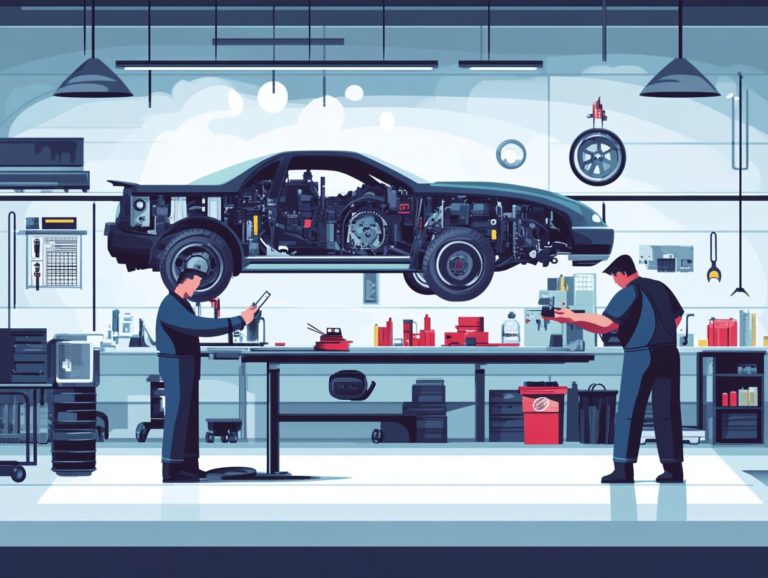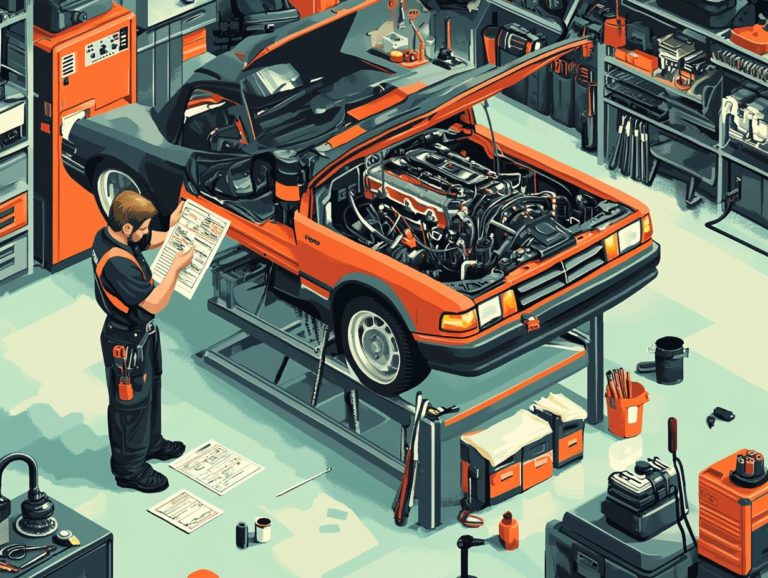Key Factors in a Car’s Resale Value
When you’re preparing to sell your car, understanding its resale value can greatly enhance your financial return.
Resale value is affected by many factors, such as the brand, age, condition, and prevailing market demand.
This guide will delve into the concept of resale value. It will pinpoint essential elements that can influence it and offer practical tips to help you maintain a high resale value.
Whether you’re contemplating a sale in the near future or simply looking to safeguard your investment, this information is tailored for you.
Contents
- Key Takeaways:
- Understanding Car Resale Value
- Factors that Affect Resale Value
- Tips for Maintaining High Resale Value
- Frequently Asked Questions
- What are the key factors that affect a car’s resale value?
- How does the make and model of a car impact its resale value?
- Is the age of a car a significant factor in its resale value?
- How does mileage affect a car’s resale value?
- What role does the condition of a car play in its resale value?
- Does market demand affect a car’s resale value?
Key Takeaways:

- Brand and model play a significant role in determining a car’s resale value. Popular and reliable brands/models tend to hold their value better in the market.
- The age and mileage of a vehicle can greatly impact its resale value. Low mileage and a younger vehicle can lead to a higher resale value.
- Proper maintenance, documentation, and care can help maintain a high resale value for a car. Regular maintenance, keeping records, and proper storage can help showcase a car’s value to potential buyers.
Understanding Car Resale Value
Understanding car resale value is essential for you, whether you re a current owner or a potential buyer in the automotive market.
Resale value indicates how much a used vehicle can fetch after a certain period. It is shaped by several factors, including the vehicle’s condition, mileage, and prevailing market trends.
Resources like the Kelley Blue Book offer valuable insights into evaluating a car’s worth based on these criteria, enabling you to make informed decisions about car ownership and its financial ramifications.
What is Resale Value?
Resale value refers to the estimated worth of your used car when it s time to sell it after the initial purchase. This value is influenced by various factors, including the overall condition of the vehicle and the prevailing market trends.
To calculate this value, you ll want to assess elements such as the vehicle s age, mileage, service history, and any damage it may have incurred over the years.
As a buyer, you consider brand reputation and desirability during your decision-making process. These factors significantly affect the final selling price. For example, a meticulously maintained vehicle from a respected manufacturer typically commands a higher resale value compared to one with dubious maintenance records or a past filled with accidents.
Understanding these factors now can help you maximize your car’s value when it s time to sell!
Factors that Affect Resale Value
Several critical factors influence the resale value of your used car, including the vehicle’s age, mileage, overall condition, accident history, and any mechanical issues. It’s also important to consider key factors when buying new cars to ensure a better investment.
Each of these elements interacts with consumer demand and current market conditions, ultimately shaping the vehicle’s worth. Understanding this complex interplay can enable you to make informed decisions when it comes to selling your car.
Brand and Model
The brand and model of a used vehicle play a crucial role in determining its resale value. Some manufacturers are renowned for producing reliable vehicles that retain their value far better than luxury brands, which often depreciate at a quicker pace.
Take brands like Toyota and Honda, for example. They consistently earn high marks for reliability, making their vehicles highly sought after in the used car market. Consumers often gravitate toward these brands because of their reputation for low maintenance costs and impressive longevity.
On the other hand, luxury brands like BMW and Mercedes-Benz can see sharp depreciation within the first few years. Potential buyers tend to hesitate, wary of the elevated upkeep costs associated with luxury vehicles.
This creates a diverse market where the demand for dependable, fuel-efficient models frequently eclipses the allure of high-end options, ultimately influencing overall resale values.
Vehicle Age and Mileage

Vehicle age and mileage are crucial factors in determining resale value. Vehicles typically lose value rapidly in their first few years, and mileage significantly influences this loss and overall attractiveness.
This decline is especially evident for cars that have been driven extensively. Higher mileage indicates wear and tear, making these vehicles less appealing in the used car market. Buyers tend to prefer low-mileage vehicles, viewing them as more reliable with lower maintenance costs. This preference boosts their resale value.
A car’s condition, maintenance history, and unique features also impact its market appeal. While age contributes to its inherent value loss, mileage often makes or breaks a deal for sellers and buyers, ultimately defining the vehicle’s true worth.
Condition and Maintenance History
The overall condition of your used car including its exterior and interior along with documented maintenance records, significantly influences its resale value. When potential buyers evaluate a vehicle, they consider both its mechanical performance and visual appeal.
If your car shows signs of neglect or visible wear, it may be viewed as less desirable. Those who prioritize their vehicle’s appearance by regularly cleaning and addressing minor issues often receive better offers.
Comprehensive maintenance records are a strong testament to your car’s reliability, building buyer confidence. A vehicle that has received consistent upkeep, demonstrated through timely oil changes and inspections, commands a higher price and attracts a wider audience in the competitive used car market.
Market Demand and Competition
Market demand and competition are important factors that can significantly affect the resale value of used vehicles. When the economy fluctuates, buyer preferences and pricing can shift dramatically.
As economic indicators change like rising unemployment or shifts in disposable income potential car buyers may reassess their budgets, leading to more cautious spending. This change makes it essential for sellers to adapt quickly to attract buyers!
With more individuals seeking affordable options, the availability and condition of used vehicles directly impact their desirability. The relationship between supply and consumer interest is ever-changing, illustrating how market demand influences pricing strategies in the used automotive market.
Tips for Maintaining High Resale Value
To preserve high resale value, prioritize regular maintenance and keep detailed service history and repair records updated to boost your car s resale value!
Consider how car modifications and aftermarket options may influence your vehicle’s worth later on.
Regular Maintenance and Repairs
Regular maintenance and timely repairs are essential for preserving your vehicle’s condition and resale value. Neglecting your car can lead to mechanical issues that deter potential buyers.
By following a consistent maintenance schedule, you ensure that critical tasks like oil changes, tire rotations, and brake inspections are completed on time. This approach enhances your vehicle’s performance and prevents minor issues from escalating into costly repairs.
A well-maintained vehicle attracts buyers, often resulting in higher offers and quicker sales. Prioritizing maintenance not only safeguards your safety but also protects your investment, giving you peace of mind while maximizing future returns.
Keeping Records and Documentation

Keeping careful records and documentation of maintenance and repairs enhances your vehicle’s resale value. It also provides potential buyers with a clear view of its service history.
This approach instills confidence in buyers and highlights your commitment to maintaining the vehicle, which can be a key selling point.
As a vehicle owner, you should diligently maintain a variety of records. This includes detailed maintenance logs that track routine services like oil changes and tire rotations.
Retaining receipts for repairs allows prospective buyers to verify the quality of the service performed. A comprehensive accident history demonstrates how well the vehicle has been cared for following any incidents.
By establishing an organized repository of these documents, you can foster trust with potential buyers. This can significantly increase the chances of a smooth transaction.
Upgrades and Modifications
Upgrades and modifications can greatly influence a vehicle s resale value. Certain aftermarket products made by a company other than the original manufacturer can enhance its appeal, while others might deter potential buyers due to customization that doesn t align with common preferences.
For instance, when you add a high-performance exhaust system or upgrade to premium wheels, you significantly elevate your car’s attractiveness. This is especially true among enthusiasts who are always on the lookout for performance enhancements.
On the flip side, personalized modifications like flashy paint jobs or unconventional body kits could alienate traditional buyers. These choices may come off as unappealing or overly eccentric.
Features like advanced infotainment systems and improved safety technologies enhance market value. However, excessive modifications to the engine can raise red flags regarding reliability or potential maintenance issues.
Ultimately, understanding which upgrades resonate with your target market is key. Make sure you choose wisely to attract buyers fast!
Proper Care and Storage
Proper care and storage of your vehicle are essential for preserving its condition. Protecting against issues that could diminish its resale value is crucial.
By adopting best practices like regular washing and waxing you can safeguard your vehicle’s paint from harmful UV rays and pollutants. Investing in a quality cover during storage will shield it from dust, debris, and adverse weather conditions.
Maintaining optimal tire pressure and conducting routine mechanical checks can prevent deterioration. This significantly enhances your vehicle’s longevity and reliability.
These proactive measures not only elevate your driving experience but also present potential buyers with a well-maintained vehicle. This ultimately leads to a more favorable resale value when the time comes to sell.
Frequently Asked Questions
Here are some common questions regarding factors that affect a vehicle’s resale value.
What are the key factors that affect a car’s resale value?
The key factors that influence a car’s resale value include the make and model of the car, its age, mileage, condition, popularity, and market demand, as well as the impact of reviews.
How does the make and model of a car impact its resale value?

Certain makes and models are known for their reliability, quality, and popularity. This can greatly affect their resale value. Luxury brands and models with high demand tend to have a higher resale value than less popular brands.
Is the age of a car a significant factor in its resale value?
Yes, the age of a car is an important factor in determining its resale value. Generally, the newer the car, the higher its resale value will be, as it is likely to have fewer miles and be in better condition.
How does mileage affect a car’s resale value?
Mileage is a key factor in determining a car’s resale value. It reflects how much wear and tear the car has experienced. Generally, a car with lower mileage will have a higher resale value than one with higher mileage.
What role does the condition of a car play in its resale value?
The overall condition of a car, both inside and out, greatly impacts its resale value. A well-maintained car with minimal wear and tear will have a higher resale value compared to a car with noticeable damages or mechanical issues.
Does market demand affect a car’s resale value?
Yes, market demand is a key factor in deciding how much a car is worth when it’s sold again.
If certain brands or types of cars are popular, they will sell for more. This can happen even if other cars are the same age and have similar mileage.
So, if you re thinking about selling your car, remember that its popularity can make a big difference in how much you get!




